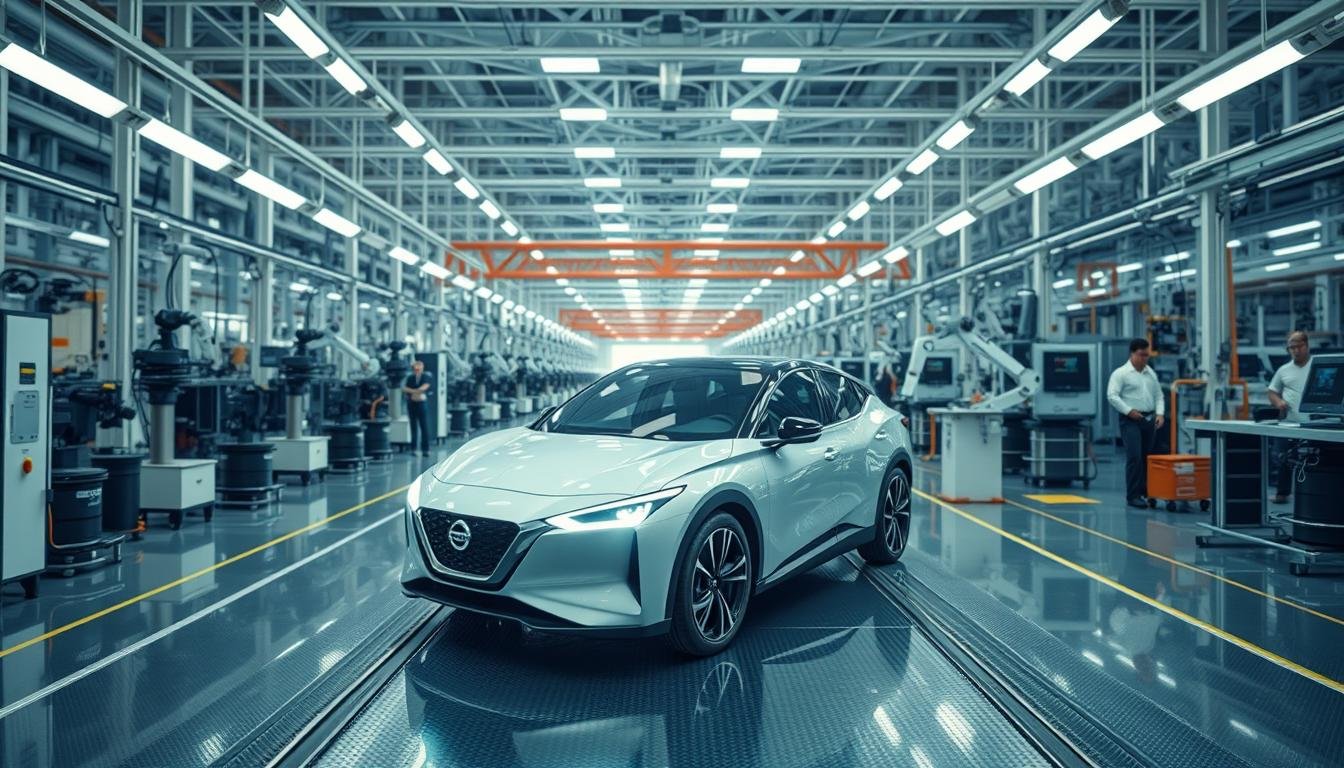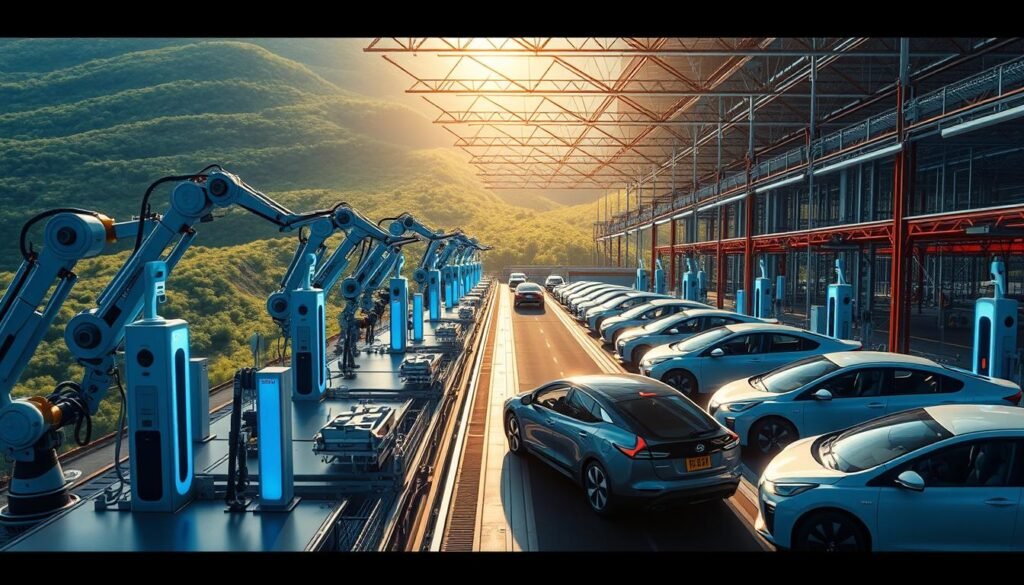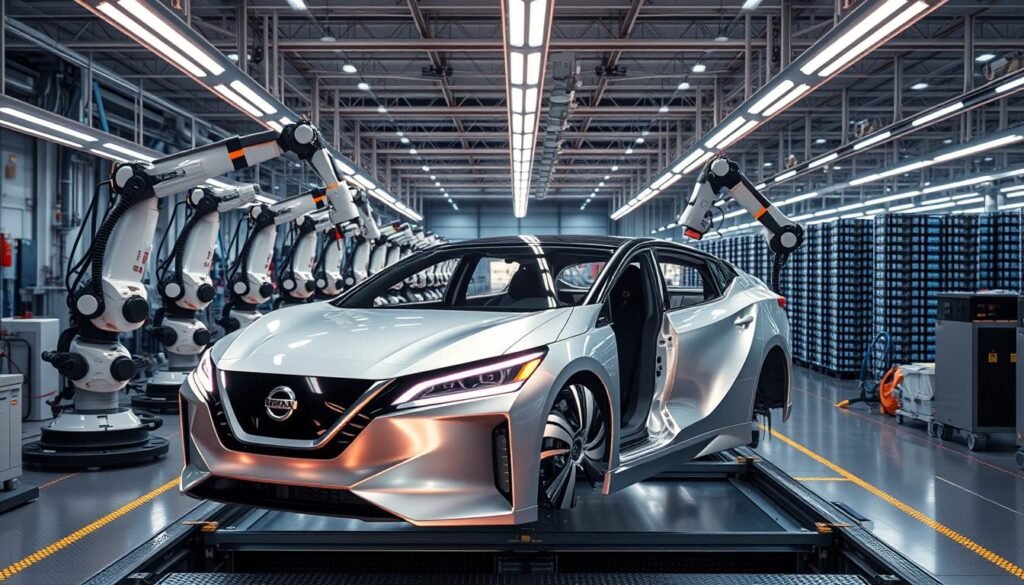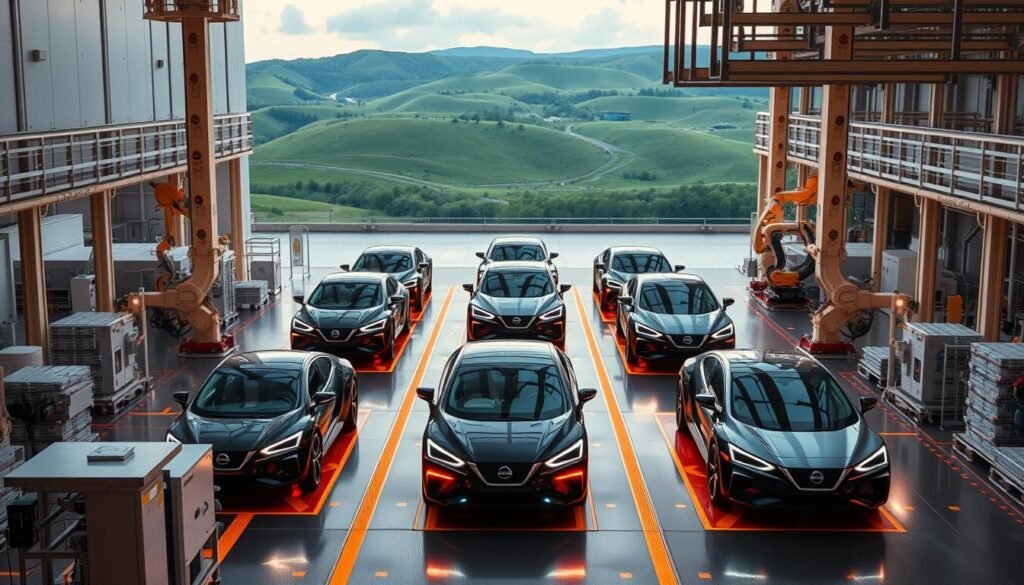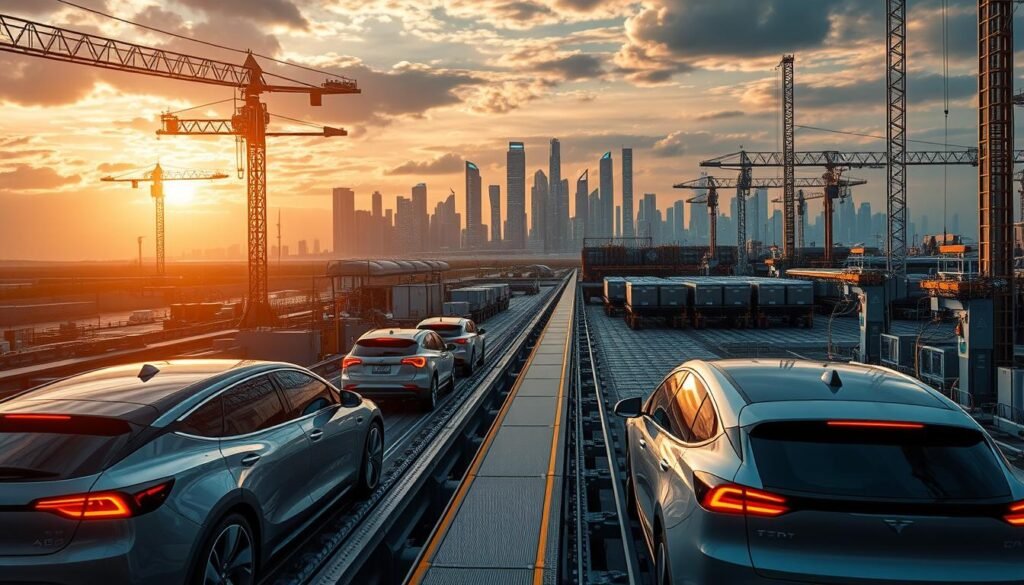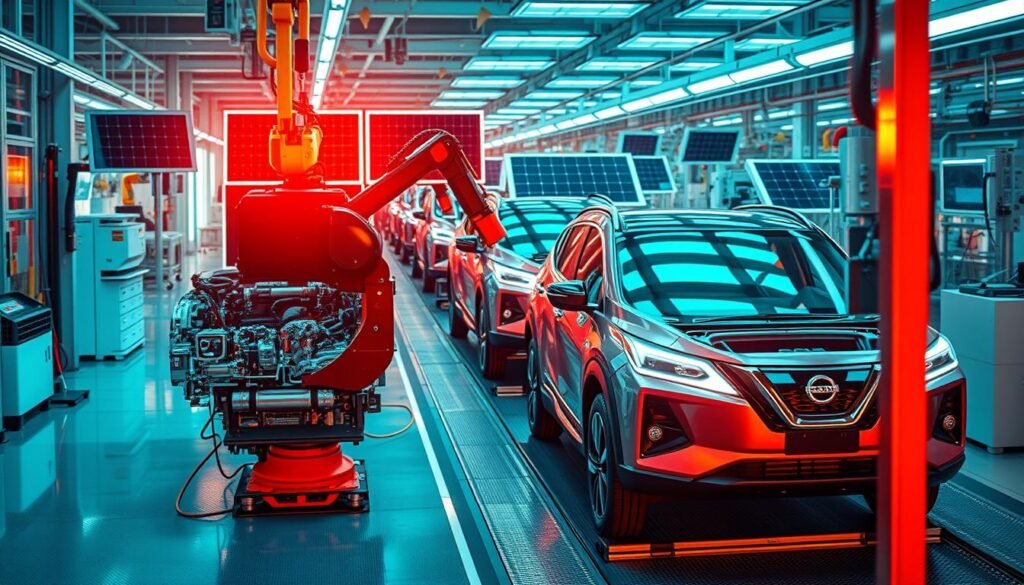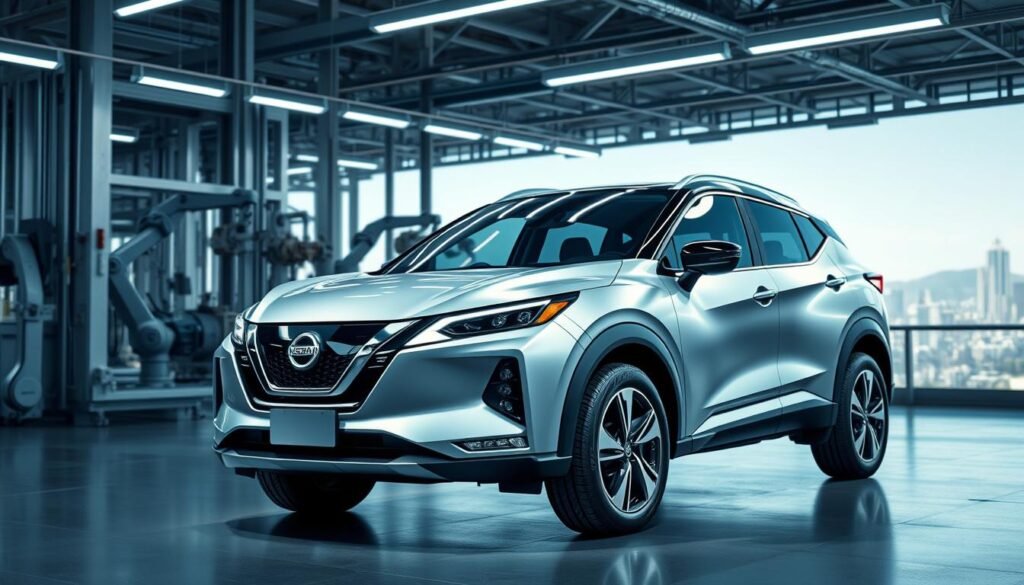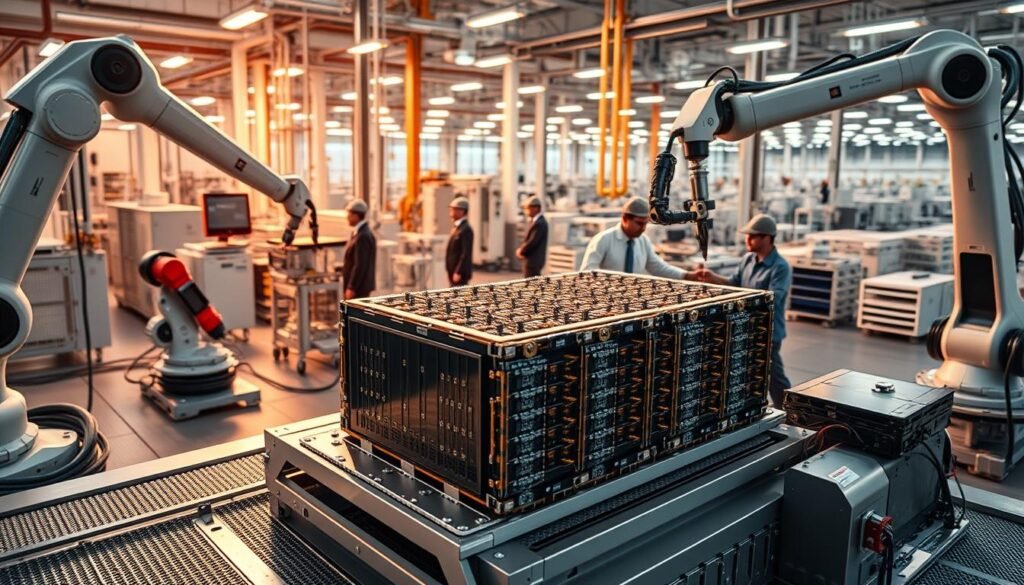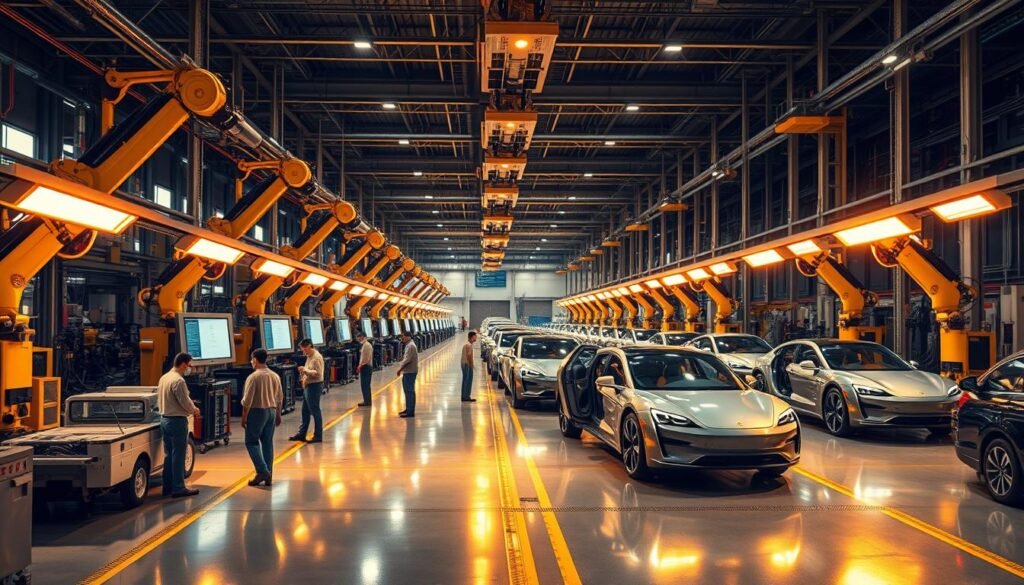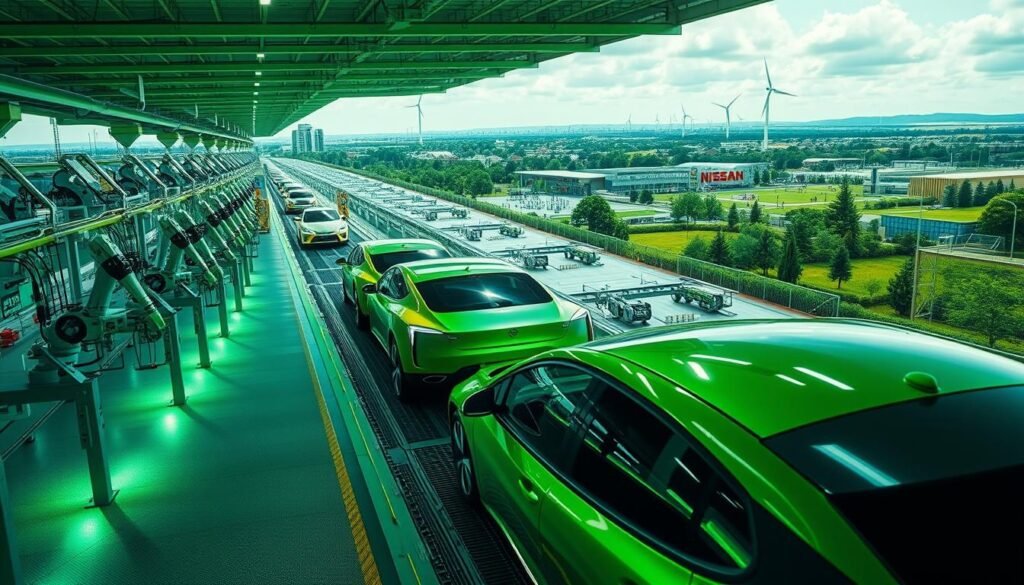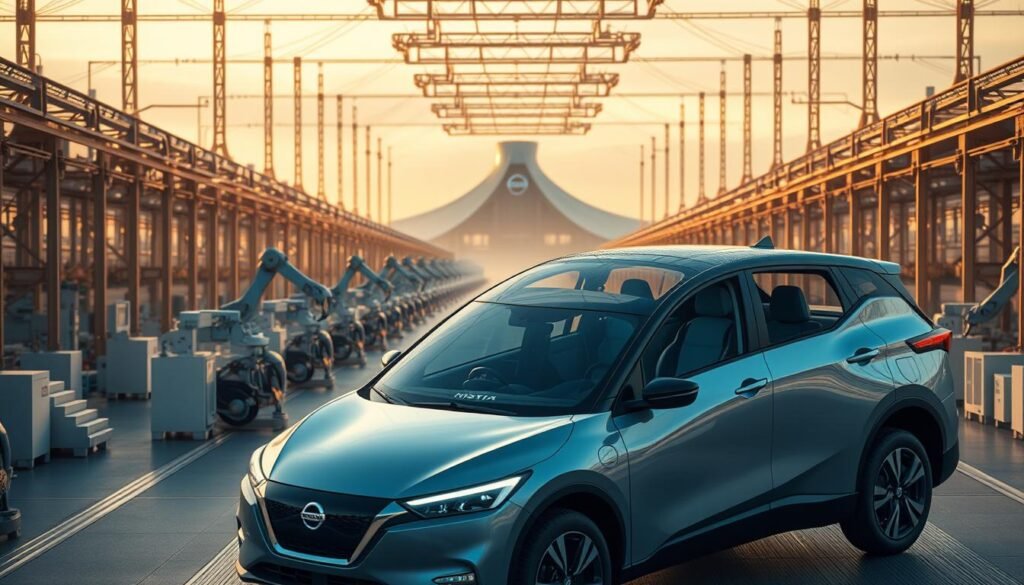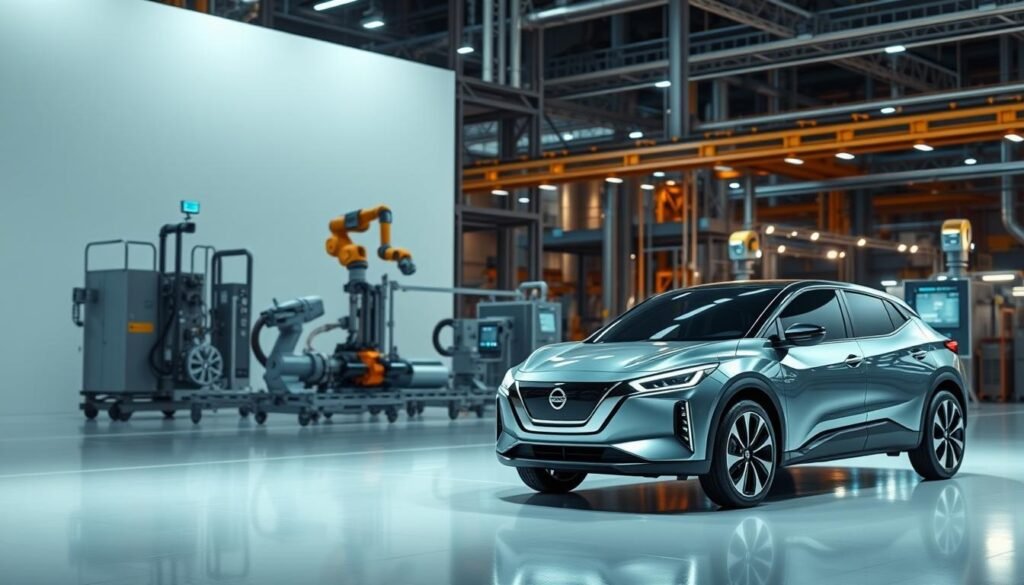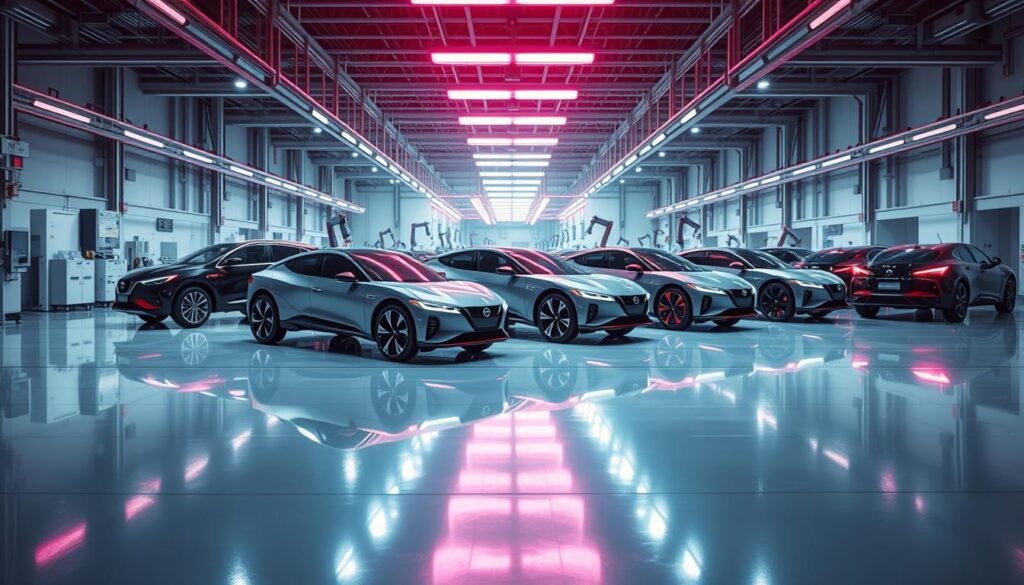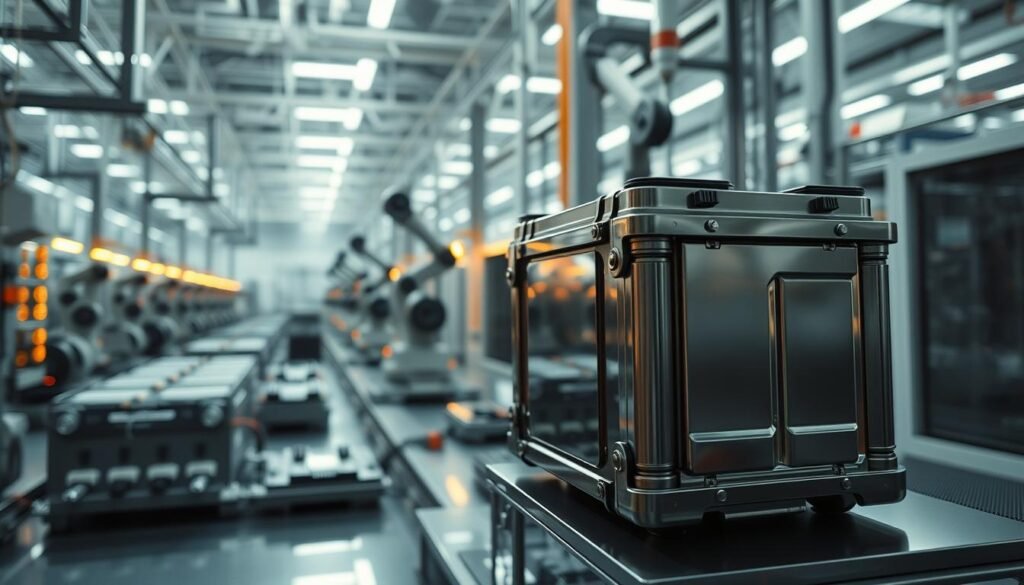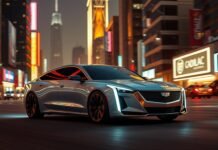Nissan is changing the car world by making its next . This includes plans to make EVs and batteries in the U.S., starting at its Tennessee plants. The goal is to have 27 electrified models by 2030, with 19 being all-electric.
SK On is a big help in this change, providing almost 100 gigawatt-hours of batteries for . This partnership makes sure Nissan has local suppliers and invests in American factories. Nissan plans to introduce a new lineup, including a LEAF successor with 265 miles range. This is 25% more than before, and an e-Power series-hybrid system will come in 2026.
Key Takeaways
- Nissan will build EVs and batteries in the U.S., partnering with SK On for 100GWh of annual battery supply.
- 27 electrified models by 2030, including 19 all-electric vehicles.
- New U.S. plants and investments aim to qualify for federal tax credits and meet consumer demand.
- The LEAF successor will offer 265 miles range, a 25% improvement over current models.
- Local production strengthens Nissan’s position in the , boosting market share and sustainability goals.
Breaking News: Nissan Announces Major U.S. Manufacturing Shift
Nissan is making a big change in its U.S. plans. They’re focusing more on electric vehicles (EVs) and making batteries. The nissan ev factory tennessee and nissan battery plant usa will be key in this change. They’re investing $13.5 billion in the U.S., showing a big commitment.
This nissan factory news is a big move. It’s all about meeting the growing demand for EVs and getting benefits from the Inflation Reduction Act.
The Announcement Timeline
- Nissan first hinted at EV production in Mississippi in 2022, targeting 2025 start dates.
- Plans for the nissan ev production goals now include two all-electric models at the Canton plant by 2025.
- A $500 million investment in Canton was paused in 2023 but revived with a 2028 launch for five next-gen EVs.
Key Elements of Nissan’s Strategy
The nissan ev manufacturing update includes a $500 million upgrade to the Canton facility. The nissan factory investment will help make two EVs a year. This includes an nissan builds future in usa Infiniti model.
By 2030, Nissan wants 40% of U.S. sales to be electric. They plan to offer 23 electrified models worldwide.
Industry Reaction to the News
“This move positions Nissan to compete aggressively in the EV race,” said automotive analyst Sarah Chen. “The nissan battery plant usa expansion could cut production costs by 30%.”
Experts say this change helps with supply chain issues and gets tax benefits. But, there are challenges like delays and training the workforce.
Why Nissan EVs Built in the USA Matters
Nissan is now making u.s. ev manufacturing a priority. This change is to meet U.S. market needs. By focusing on american-made nissan evs, Nissan hopes to get federal incentives.
This move comes after Nissan faced delays at its Canton plant. The delays have been rescheduled for 2028.
“This agreement with SK On supports further investment in U.S. manufacturing,” stated Nissan Americas’ chairman Christian Meunier, highlighting the partnership for domestic ev production.
One big plus is the use of ev batteries made in america thanks to SK On. This ensures Nissan meets tax credit rules. By focusing on u.s. auto manufacturing, Nissan also reduces its reliance on overseas supply chains.
Despite some job cuts, Nissan is focusing on electric car made in usa models. This includes the upcoming Leaf successor and two crossovers.
Nissan’s strategy is in line with a 92% increase in U.S. EV inventory. This shows Nissan is ready for the growing demand. But, there are delays in ev production usa timelines, like the 15-month shift for the LZ1F sedan.
By 2028, the Canton plant will make four EVs. This will use $500M that was previously halted. The funds will go toward battery tech and infrastructure.
This shift helps Nissan compete in a market where 1.2M EVs were sold last year. Despite challenges, like the discontinued PZ1L crossover, Nissan is focusing on u.s. ev manufacturing. This makes Nissan more resilient in the long run.
As the U.S. market grows, Nissan’s domestic production meets compliance and cost efficiency. It also meets consumer demand for electric car made in usa options.
Inside Nissan’s Tennessee Investment Plans
Nissan’s nissan plant smyrna is key to its U.S. electric vehicle plans. They’re spending $500 million to update assembly lines for evs assembled in usa. The goal is to make 150,000 LEAF EVs a year by 2025, creating more ev factory jobs usa.
Smyrna Plant Transformation
The 9.4-million-square-foot facility will get new robotics and charging systems. A nearby battery plant, 75% done, will open by 2022. It will make 200,000 batteries a year. This nissan tennessee ev center also has Nissan North America’s Decherd plant for powertrain parts.
Capital Investment Figures
- $500 million allocated to Smyrna for EV production upgrades
- Total U.S. investments by Nissan exceed $13.5 billion
- $682.7 million spent on the Decherd powertrain facility
Nissan’s nissan usa investment shows its dedication to making cars in America.
Timeline for Facility Updates
Updates will finish by 2025, ready for LEAF production. The battery plant will open in 2022. Nissan’s Mississippi factory will join by 2027, matching federal ev plant in tennessee plans.
Battery Production Partnerships Forming Stateside
Nissan is teaming up with nissan ev partnerships to improve the battery supply chain usa. A ev battery production plan with SK On will make nearly 100GWh of batteries for U.S.-made car batteries by 2033. This $661 million deal aims to create u.s. made ev battery systems and 1,700 jobs. It shows Nissan’s dedication to making things in the U.S. under the Inflation Reduction Act.
SK On’s advanced nissan battery technology will power future EVs. It will increase range and performance. This partnership helps meet U.S. goals to make more ev battery supply u.s. and cut down on imports. Key points include:
| Company | Partner | Investment | Capacity (GWh) | Jobs |
|---|---|---|---|---|
| Nissan | SK On | $661M | 100 (2028–2033) | 1,700 |
| BMW | Envision AESC | $810M | 30 | 1,170 |
BMW’s South Carolina plant, part of a bigger battery plant expansion, adds 30GWh every year. These investments show car makers’ push to meet U.S. demand. Nissan’s deal means u.s. made car batteries for EVs, saving money and reducing carbon emissions. More partnerships could make America’s EV scene even stronger.
Meeting Inflation Reduction Act Requirements
Nissan is moving its U.S. manufacturing to meet the inflation reduction act ev rules. This move helps the company get federal nissan ev tax credit benefits, up to $7,500 per car. It also helps Nissan follow the rules and offer more american ev incentives to buyers.
EV Tax Credit Eligibility Explained
To qualify for the ev tax credit eligibility, cars must be made in North America. They also need battery parts from approved countries and must not cost too much. Nissan’s Tennessee plant meets these rules by working with SK On.
Domestic Content Requirements
| IRS Requirement | Nissan’s Compliance |
|---|---|
| 40% domestic battery mineral sourcing by 2024 | Partnerships with U.S. suppliers for lithium and cobalt |
| 50% North American final assembly by 2024 | Smyrna plant expansion meets 100% U.S. final assembly |
| 75% regional battery component sourcing by 2029 | SK On’s Tennessee battery plant supplies 90% domestic content |
How Nissan’s Strategy Aligns with IRA
Nissan’s ev production incentives plan matches IRA goals. By 2024, 95% of its U.S.-made EVs will qualify for u.s. ev tax breaks. The company’s nissan and ira compliance includes:
- Phased-in mineral sourcing to meet 2029 IRA targets
- Waivers for ev credits nissan buyers by verifying VIN-based assembly origins
- Annual audits with SK On to track North American content percentages
By 2023, 68% of Nissan’s U.S. EV sales growth came from IRA-compliant models. This move helps Nissan avoid penalties and offer more american ev incentives to customers. Nissan stays eligible for all ev tax credit eligibility phases until 2030.
Next-Generation Models: What to Expect
Nissan’s nissan ev 2025 lineup is set to bring innovation and make electric cars more accessible. The nissan leaf successor, known as nissan leaf 2.0, is a nissan electric compact car. A new nissan ariya made in usa will also be available, building on the current nissan ariya production.
These cars will join at least two more nissan electric crossover models at the Mississippi plant. By 2026, Nissan will have a strong lineup of nissan electric suv vehicles.
- Nissan Leaf 2.0: It’s expected to have over 300 miles of range and a modern design, meeting nissan ev 2025 standards.
- Nissan Ariya: The nissan ariya made in usa will charge faster with NACS compatibility, reaching 80% in 35 minutes.
- New Electrics: Two more nissan electric crossover models and an nissan electric compact car will focus on being affordable and tech-savvy.
The next-gen nissan evs will use advanced tech like biosensors and V2H energy systems. The 2026 electric suv by nissan models will also focus on being eco-friendly, aiming to use all-solid-state batteries by 2028. The prices will be competitive, aiming to be lower than Tesla’s Model Y while keeping luxury features.
The nissan ariya production line in Mississippi will start making cars by late 2025. The nissan leaf 2.0 will hit the market in 2026. These nissan electric crossover and nissan electric suv models will change the game for U.S. drivers, focusing on both affordability and performance.
Battery Technology Innovations Coming to Tennessee
Nissan is working on nissan battery innovation in Tennessee. They’re focusing on nissan solid-state batteries and advanced lithium-ion systems. These new techs aim to make EVs better and support U.S. manufacturing.
The solid state battery nissan projects are part of
Solid-State Battery Development
Nissan is researching solid-state tech for better energy and safety. By 2033, they plan to make these batteries in the U.S. with SK On. These nissan clean car techs might be in future Leaf and Ariya models.
But, there are challenges like cost and making enough. Yet, they’re on track to meet 2030 sustainability goals.
Advanced Lithium-Ion Improvements
SK On is making high-nickel lithium-ion batteries. This $661M investment helps battery innovation usa. It will make EVs go farther and charge faster.
These battery evs nissan upgrades also improve how they work in different temperatures. This makes EVs more reliable for everyday use.
Battery Longevity and Performance Goals
Nissan wants batteries to last over 1,000 charges with little loss. They’re using advanced systems to monitor this. They also plan to use old batteries for energy storage in Franklin.
This reduces waste and helps keep the grid stable. Partners like Middle Tennessee Electric are helping make nissan sustainable tech a reality.
| Project | Details | Impact |
|---|---|---|
| Smyrna Plant | 1.3M sq ft, 200k batteries/year | 1,300 jobs, LEAF production |
| SK On Partnership | 100GWh by 2033 | 1,700 U.S. jobs, $661M investment |
| BESS Initiative | Grid storage from repurposed batteries | Enhances energy resilience |
Nissan’s nissan technology plans make Tennessee a key place for battery evs nissan and grid tech. These steps help Nissan reach its 2030 goal of being carbon-neutral. They also make the U.S. a leader in EV tech.
Economic Impact: Jobs and Growth in American Manufacturing
Nissan’s move to EV production in the U.S. boosts ev factory jobs usa and strengthens automotive manufacturing usa. The partnership with SK On will create 1,700 jobs at the Smyrna plant. Nissan also invests $500 million to upgrade its Canton facility.
These actions support Nissan’s ev boom nissan strategy, aiming for nissan ev growth 2025. Each u.s. auto jobs ev role supports over 10 jobs in supply chains. This helps local economies grow.
| Company | Investment | Jobs Created |
|---|---|---|
| Nissan | $500M | EV assembly roles |
| SK On | $661M | 1,700 direct positions |
The domestic ev growth push is part of a $140.9 billion industry by 2025. Nissan’s strategy includes training workers for advanced manufacturing. Programs cover robotics, battery tech, and sustainable practices.
This aligns with IRA incentives, ensuring nissan ev impact usa drives long-term economic stability.
By 2025, the hybrid and electric vehicle sector will see 268 companies and 37.1% growth. Nissan’s $500M Canton investment fits these trends, making the U.S. a leader in the ev manufacturing revolution. With over 9.7 million auto-related jobs nationally, EV expansion could redefine regional economies and supply chains.
Nissan’s Environmental Goals Through Localized Production
Nissan is making a big change by starting EV production in the U.S. This move helps meet its nissan environmental goals and nissan sustainability mission. By making cars closer to where they are sold, Nissan reduces emissions from shipping.
This approach supports a nissan green future. It also fits with nissan sustainability news about using cleaner energy and lowering carbon footprints.
Now, U.S. plants use renewable energy and efficient processes. Nissan wants to cut carbon emissions by 40% by 2030. This is part of its nissan carbon reduction efforts.
The nissan green initiative also includes recycling and using eco-friendly materials. This shows Nissan’s commitment to a greener future.
Nissan aims to achieve carbon neutrality across the life cycle of its products by fiscal year 2050.
Here are some key targets for Nissan by 2030:
- Reduce emissions by 40% from 2019 levels.
- Make 50% of global sales electric by 2030, with 40% in the U.S.
- Use 100% renewable energy in plants by 2030.
These steps help Nissan meet its nissan clean energy goals and support nissan green mobility. By 2030, Nissan’s U.S. plants will run on solar and wind energy. This will greatly reduce their use of fossil fuels.
The nissan 2030 vision makes sure sustainability is at the heart of everything Nissan does. This includes factories and supply chains.
How U.S.-Built EVs Will Become More Affordable
Nissan wants to make nissan ev affordability a reality. They plan to do this by making ev made for america at their electric car factory usa. This move cuts down on costs from shipping and tariffs.
By producing nissan local production, they also make the supply chain secure evs stronger. This reduces the risk of global disruptions.
“Through this smart partnership with SK On, we can leverage their growing U.S. production capacity to deliver affordable ev nissan options,” highlights the benefit of domestic battery production via nissan builds batteries usa.
- Localized nissan local factory operations eliminate import duties and overseas logistics expenses.
- Qualifying for up to $7,500 in federal tax credits under the Inflation Reduction Act lowers upfront costs.
- Partnering with SK On ensures stable battery supplies, reducing price volatility tied to global shortages.
| Factor | Impact |
|---|---|
| Domestic battery production | Cuts battery costs by 15-20% |
| Tax incentives | Reduces vehicle prices by up to $7,500 |
| Localized supply chains | Stabilizes costs and availability |
Nissan’s move to nissan goesse electric meets U.S. demand for affordable nissan ev options. As production grows, nissan builds batteries usa leads to more efficiency. This makes EVs more accessible to more drivers.
Comparing Nissan’s Approach to Other Automakers
Nissan’s ev production strategy in the U.S. focuses on ev supply chain localization. This is to compete with rivals like Ford and GM. Nissan plans to use partnerships and nissan electrification goals to meet its 2030 roadmap. Here’s a look at how Nissan differs from others in the automotive manufacturing usa scene:
| Automaker | Key Strategy | Battery Approach | 2025-2030 Targets |
|---|---|---|---|
| Nissan | Focus on nissan ev expansion via Tennessee partnerships and ev development in usa plants | Solid-state battery pilot by 2028, aiming for $65-75/kWh cost | 16 electrified models by 2026; 44% global electrified sales mix by 2026 |
| Ford | BlueOval City in Tennessee targeting 500,000 EVs/year | Lithium-ion focus; no solid-state commitments | 40% of U.S. sales to be EVs by 2030 |
| GM | Ultium platform conversions across 31 plants | Lithium-ion-only strategy | 30+ EV models by 2025; 100% EV sales in North America by 2035 |
| Tesla | Vertically integrated factories like Texas Gigafactory | Exclusive lithium-ion production | Target 2 million EVs/year globally by 2025 |
Nissan aims to have 19 EV models by 2030. Ford and GM are focusing on making more EVs. Unlike Tesla, Nissan is using U.S. suppliers for its nissan electric cars 2025. This approach helps keep costs down and ensures Nissan can compete in the U.S. market.
The Future Nissan EV Lineup for American Drivers
Nissan is expanding its future electric nissan lineup to meet growing demand in America. By 2025, they plan to introduce 16 new electric models. This includes four nissan ev models future from their Canton plant starting 2028. These vehicles will use advanced nissan ev platforms for better range and performance.
Nissan’s goal is to make EVs accessible and desirable for all drivers,” says the company’s U.S. strategy brief.
Look out for a redesigned nissan ev sedan and a compact nissan electric hatchback in 2026. These models will update the LEAF’s legacy with new tech and ranges over 400 km. The future nissan lineup will also include an all-new Ariya crossover, with a range of 610 km.
| Model | Platform | Estimated Range | Release |
|---|---|---|---|
| Nissan EV Sedan | CMF-EV | 400+ km | 2026 |
| Nissan Electric Hatchback | New EV Platform | 350 km | 2027 |
| Leaf Successor | Solid-State Tech | 500+ km | 2028 |
These vehicles will focus on affordability and innovation, thanks to over 75 years of EV experience. Nissan hopes to make nissan electric vehicles a common sight in American driveways by 2030.
Supply Chain Resilience Through Domestic Manufacturing
Nissan is making a big move by starting U.S. battery production with SK On. This move makes supply chain secure evs stronger and helps meet u.s. ev supply chain goals. By making things locally, Nissan cuts down on risks like shipping delays and trade issues.
The Smyrna plant is making great strides, producing 382,852 vehicles in 2024. This shows Nissan is on track with ev production growth. They’re also working on ev battery recycling to solve raw material shortages.
“Moving production from Mexico back to Japan would have a ‘huge impact to profit,’ warned Uchida, underscoring the strategic importance of domestic facilities.
With the Smyrna plant and new Integrated Logistics Centers, Nissan is making things faster. They aim to meet 2030 goals with nissan ev timeline. They’re also adding more U.S. charging stations to make it easier for customers.
Even with challenges like China’s lead in cobalt and lithium, Nissan is moving forward. They’re working on making the battery supply chain usa more independent. By 2023, 76% of Mexico’s 3.5 million vehicles exported to the U.S. faced tariffs. So, Nissan’s focus on domestic ev plant announcements is key.
Nissan is finding a balance between cost and supply chain secure evs. This ensures stability in a world full of disruptions.
Conclusion: Nissan’s American-Made Electric Future
Nissan is making a big move by starting nissan u.s. production. By 2030, they plan to release 23 electrified models, with 15 being all-electric. This move shows Nissan’s commitment to leading in electric cars.
They want to make cars in America to save money and work better. The electric crossover usa is one example. It’s made for long drives, up to 200 miles, to meet what American drivers want.
Nissan is also building electric car battery factories. This will make batteries 65% cheaper by 2028. Thanks to federal help, electric cars will be more affordable by 2025.
Nissan is investing $17.6 billion in U.S. facilities and partnerships. This supports jobs and reduces risks in the supply chain. EV sales are expected to beat gas cars by 2033.
Nissan is also focusing on being green, aiming to cut carbon emissions by 50% by 2030. The Smyrna plant is being updated, and they’re working with U.S. suppliers. By 2030, they hope 50% of their sales will be electric.
This change will help American manufacturing and keep Nissan at the top of the EV market. It’s a big step towards a greener future.
